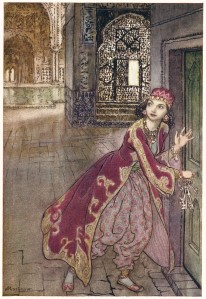Enough with opera! Back to business!
 An embarrassment of missing eyes now engulfs us. The three one-eyed dervishes rolled up at the home of the three beautiful girls (you haven’t forgotten them, have you?). The first and second dervishes have fully recounted the misadventures that led to the disappearance of their precious orbs. Ajib ibn Khadib, however, has not yet explained exactly how, when it comes to the loss of his eye, he is not the innocent victim of fate like his fellow dervishes.
An embarrassment of missing eyes now engulfs us. The three one-eyed dervishes rolled up at the home of the three beautiful girls (you haven’t forgotten them, have you?). The first and second dervishes have fully recounted the misadventures that led to the disappearance of their precious orbs. Ajib ibn Khadib, however, has not yet explained exactly how, when it comes to the loss of his eye, he is not the innocent victim of fate like his fellow dervishes.
He is too busy telling us how he is the blameless victim of fate, cast by the unfeeling stars as the unwilling murderer of innocent youth.
But this painful saga is not what he set out to tell us about – it is merely the preamble, the aperitif. The main course must be truly amazing then, you’d think. But in fact it’s a bit of a let down after the thrilling combination of astrology and accidental assassination to which we have just been treated.
The most curious thing about it is the number of right eyes involved. Ten, to be precise, each eye belonging to a different man, and all lost! Isn’t that astonishing?
The ten guys who’ve lost their right eyes are understandably not very happy about it and have a nightly ritual of grief that serves the dual purpose of expressing their feelings and warning off anyone who might be tempted to visit the scene of their disorbment to ‘see for themselves’.
Although they are not a pretty sight, and are at pains (for over a month!) to tell Ajib that it was their unrestrained inquisitiveness that led to their plight, he can no more restrain his own curiosity than they and in a flash we are back in the arena of ‘prohibition’ where everything is marvellous and you can have the best sex ever with the most beautiful women in the world for a whole year but don’t ask questions and don’t visit the forbidden room.
The storyteller wheedles us along with elaborate descriptions of the attractions of the forty (forty!) beauties and what fun they are to sleep with. I do wonder what the three ladies of the house who are listening with us to this concoction make of that. Is not their beauty far above that of any foreign hussy? And when the beauties (all princesses, naturally) depart and leave Ajib to his own devices, we get further extravagant descriptions of the thirty-nine fantastic treasure rooms he is free to roam. And the fortieth room.
I found a fragrance the like of which I had never smelt before. It overcame my senses and I fell down in a faint, which lasted for an hour. Then I […] went further into the room, whose floor I found spread with saffron. Light was given by lamps of gold and candles from which was diffused the scent of musk and ambergris, and I saw two huge censers, each filled with aloes wood, ambergris and honeyed perfume whose scent filled the room. I saw a horse, black as darkest night, in front of which was a manger of clear crystal, filled with husked sesame, together with a similar manger filled with rosewater scented with musk. The horse was harnessed and bridled and its saddle was of red gold.
Quite hard to breathe after reading that.
He should not have gone in. He should not have climbed upon that horse.
Interestingly, he has stopped blaming God. Now it is all down to Satan.
As a nit-picking 21st century reader, I can tell you that the storyteller falls into a contradiction here, because we are specifically told at the beginning that all three dervishes are minus their left eyes. But Ajib assures us that it is his right eye that gets whisked out of its socket and rolls down his cheek.
And now, at last, we’re going to find out (we hope) what all that carry on with the black dogs and the self flagellation is about…


